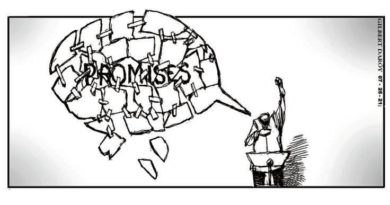EDITORIAL: BY BANGKOK POST- Criminal libel laws go too far

Criminal libel laws go too far
.
A recent libel case against a journalist, which saw her sentenced to two years in jail for her comment on workers’ grievances at Thammakaset Co’s poultry farm, speaks volumes about how harsh the punishments are under the Criminal Code’s provisions for defamation.
It also reflects the need for Thailand to review and do away with this and other criminal libel laws, which have been abused and used as tools to silence and punish government critics, activists and journalists for many years.
ADS by Cloud 9:
.
– SPACE RESERVE FOR YOUR ADVERTISEMENT –

Lop Buri provincial court on Tuesday found reporter Suchanee Cloitre guilty of defamation by publication for sending a tweet in 2016, when she was a Voice TV reporter.
Thammakaset Co filed the case against Suchanee after she commented on a court ruling in 2016, which ordered the company to pay 1.7 million baht in compensation and damages to 14 migrant workers from Myanmar who had not been paid their overtime rates throughout their stint with the company.
In her tweet, Suchanee used the term “slave labour” to describe the case, in which the workers alleged that they had been forced to work 20 hours a day without a break for 40 consecutive days or more for less than the minimum wage.
The court ruled that the term misrepresented the facts and damaged the firm’s reputation. It also pointed out that she did not check her facts prior to posting the message and, as such, her message was considered to have been made in a dishonest manner.
ADS by Cloud 9:
.
– SPACE RESERVE FOR YOUR ADVERTISEMENT –

The court then handed down the jail term without suspension. She has been released on bail and plans to appeal.
Suchanee is one among many people who have been slapped with one form of criminal libel charge or another. Thammakaset also sued the workers for criminal defamation, but it lost the case.
Under the Criminal Code, defamation carries a maximum sentence of one year’s imprisonment and/or a fine of up to 20,000 baht, while defamation by publication is punishable by up to two years in jail and/or a fine of up to 200,000 baht.
The Criminal Code’s defamation provisions have thus stood as threats against free speech. Even though the Civil and Commercial codes also have provisions to deal with defamation, many plaintiffs prefer to file criminal cases against activists and political dissidents.
ADS by Cloud 9:
.
– SPACE RESERVE FOR YOUR ADVERTISEMENT –

Rubbing salt into the wound is the Computer Crime Act, which makes the entry of “distorted information” into computer systems a crime. Due to its broad provisions, the law has been abused by authorities who have filed criminal cases against dissidents in past years.
The anti-sedition law, meanwhile, has been popular among the powers-that-be who have used it to threaten their critics over the past five years. Additionally, the Criminal Code also deems any criticism of courts as “insults” and punishable by up to seven years in jail.
Moreover, a new organic law governing Constitutional Court procedures — passed by lawmakers of the military regime — came into effect in March this year. It makes any comments on the court’s rulings punishable by up to one month in jail, if they were deemed to have been made in a “dishonest manner” or with “rude, sarcastic or malicious” intent.
These laws, in their current forms, threaten freedom of speech and they have been exploited by both the powers-that-be to deflect attention from serious allegations against them.
It is time to do away with these laws and let defamation cases be handled in civil courts.
EDITORIAL
BANGKOK POST EDITORIAL COLUMN
>
ADS by Cloud 9:
.
– SPACE RESERVE FOR YOUR ADVERTISEMENT –

THE EDITOR
 All photographs, news, editorials, opinions, information, data, others have been taken from the Internet ..aseanews.net | [email protected]
All photographs, news, editorials, opinions, information, data, others have been taken from the Internet ..aseanews.net | [email protected]
.









